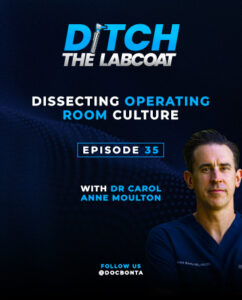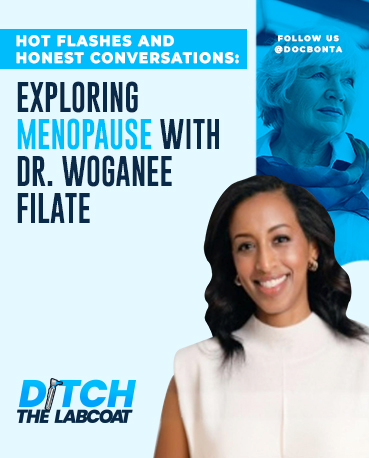On this week’s Ditch the Labcoat, I sat down Dr. Woganee Filate to have the kind of conversation we all need but rarely get: an open, honest, and deeply informative dive into women’s health—specifically menopause and perimenopause. Spoiler alert: we learned menopause is not just “getting older,” and yes, it’s high time we stop whispering when we say the word VAGINA.
VAGINA.
Here’s the high-level recap of a discussion that ranged from estrogen receptors to breaking societal taboos (with a dash of wit and wisdom):
1. Menopause: A Natural Transition:
Dr. Filate laid out a clear definition of menopause, cutting through the haze of misinformation. Menopause is officially marked by one day: the 12-month anniversary of your last period. The decade-long hormonal rollercoaster before that? That’s perimenopause, a phase where symptoms like hot flashes, mood changes, and even ringing in your ears (yes, ears have estrogen receptors too) can wreak havoc.
Takeaway: Menopause is not a vague “aging thing.” It’s a physiological transition with wide-ranging impacts—and one-third of a woman’s life may be spent in the post-menopausal stage.
2. Hot Flashes, Brain Fog, and Vaginal Dryness: Oh My!
Menopause affects everything. From skin and bone health to mood and memory, the withdrawal of estrogen changes the game. And for anyone feeling squeamish about vaginal health—get over it. Vaginal dryness and discomfort are real, treatable, and deserve as much airtime as any other health issue. Dr. Filate stressed the importance of localized estrogen therapy for vaginal health, a safe and effective treatment that’s vastly underutilized.
Takeaway: If you’re experiencing symptoms, don’t “suck it up.” Talk to your healthcare provider—and if they’re uncomfortable with the topic, find one who isn’t.
3. The Hormone Therapy Pendulum: Finding Balance
Hormone therapy used to be the “one-size-fits-all” solution for menopause symptoms—until studies in the early 2000s raised alarms about risks like breast cancer and cardiovascular disease. This led to an abrupt halt in prescriptions and a wave of fear among women. But as Dr. Filate explained, the nuances of those studies were misunderstood. For women under 65 and within 10 years of menopause, hormone therapy can be transformative for symptoms, bone health, and even cardiovascular protection.
Takeaway: The pendulum has swung back to a more balanced view—hormone therapy is highly beneficial for many women, but the dosage and delivery method matter, and it is important that this combination is applied in concert with your patients needs.
4. Menopause vs. Male Health: The Great Awareness Gap
Dr. Bonta brought up an eye-opening comparison: While erectile dysfunction has no shortage of treatments, ads, and open conversations, menopause has been historically shrouded in silence. Why? Dr. Filate attributed it to a long-standing deprioritization of women’s health. But the tides are turning, thanks to advocacy, education, and social media.
Takeaway: If we can normalize Viagra ads during football games, we can surely normalize conversations about menopause. (Looking at you, pharmaceutical marketers!)
5. Beyond Hormones: Lifestyle and Alternatives
Not everyone can or wants to take hormone therapy, and that’s okay. Dr. Filate emphasized the importance of lifestyle: strength training, balanced nutrition, and stress management. Emerging non-hormonal treatments, like medications targeting the brain’s “hot flash thermostat,” also offer promising options for symptom relief.
Takeaway: Hormone therapy is one tool, but a holistic approach to health—starting in your 30s—is key to thriving through menopause.
6. Education is the Antidote to Taboo 

A recurring theme was the lack of menopause education for healthcare providers. Many doctors receive little to no training on the topic, leaving women feeling dismissed. Dr. Filate advocated for integrating menopause into medical curricula and empowering patients to demand specialized care when needed.
Takeaway: Menopause isn’t niche—it’s mainstream. Education for both patients and providers is long overdue.
Listen to what Dr Samir Grover says on the topic in Episode 14 :
How to Make A Doctor: Digesting The Art of Medical Education With GI Specialist
& Dr. Carol Anne Moulton in Episode 35:
Dissecting the Operating Room Culture with Dr. Carol Anne Moulton
7. Women’s Health is Community Health
Dr. Filate delivered a powerful closing sentiment: When women are healthy and thriving, they uplift everyone around them—their families, workplaces, and communities. Investing in women’s health is an investment in society’s well-being.
The Final Word
Dr. Filate’s message for women in their 30s and 40s? Start now. Build strength, prioritize self-care, and educate yourself on what’s to come. Menopause is a natural transition, not a defeat. With the right tools, treatments, and mindset, it’s possible to navigate these changes with confidence.
Read more: https://lumewomenshealth.com/
Missed the episode? Tune in for the full conversation—it’s one that every healthcare provider, partner, and woman needs to hear. And remember: A hot flash might feel like the world’s ending, but with the right support, it’s just a bump in the road.
Pro Tip: Bookmark this blog, then go have that awkward but important conversation with your healthcare provider—or better yet, with a friend. Because the more we talk about it, the less awkward it becomes.

